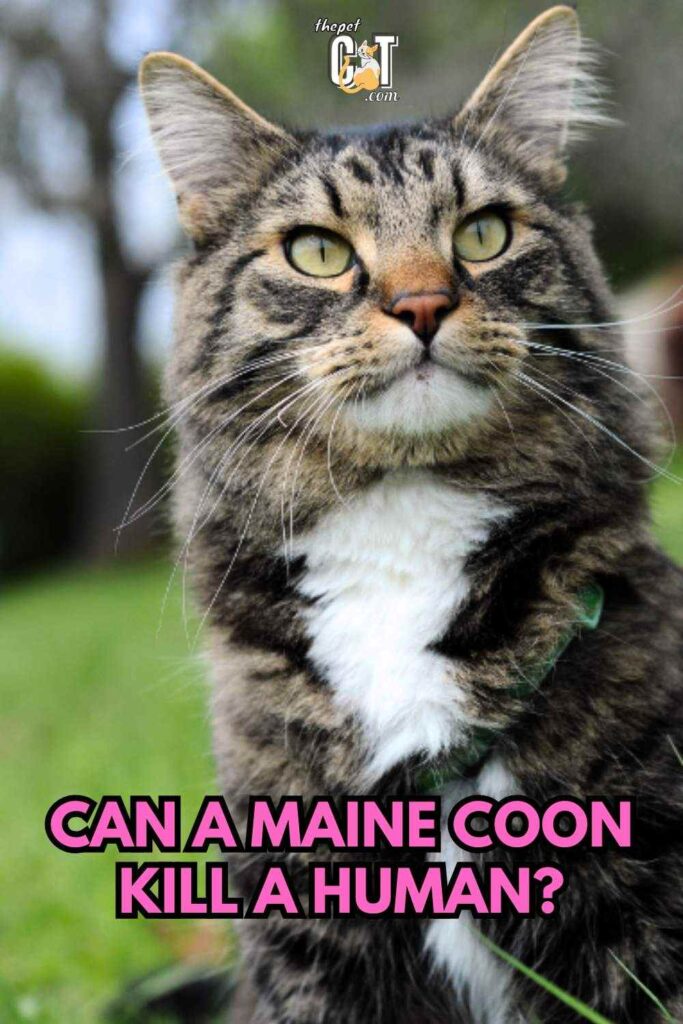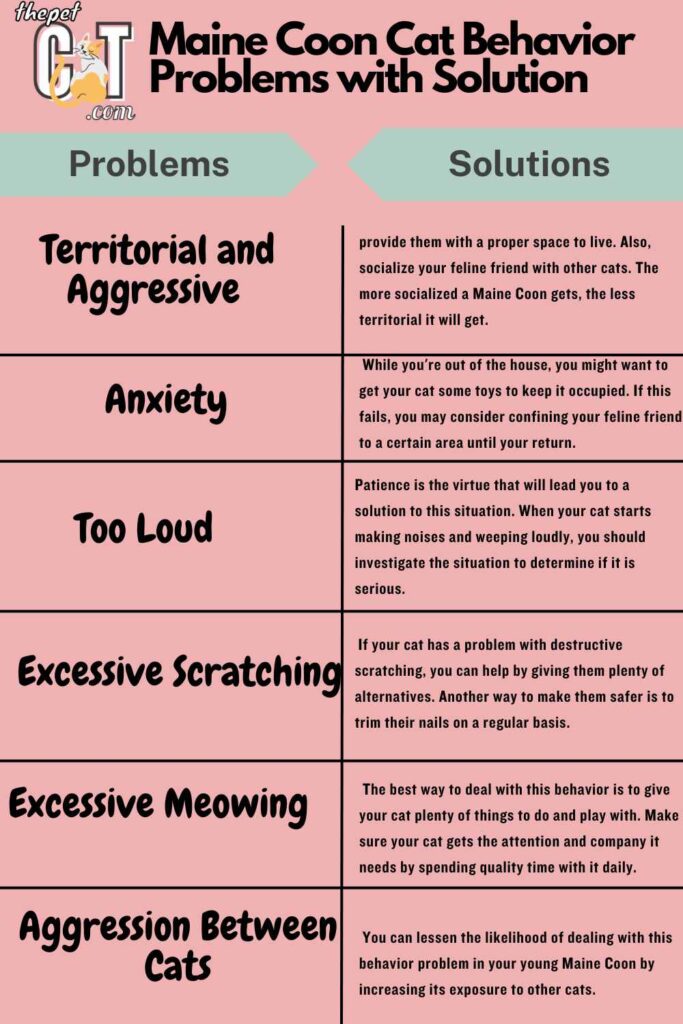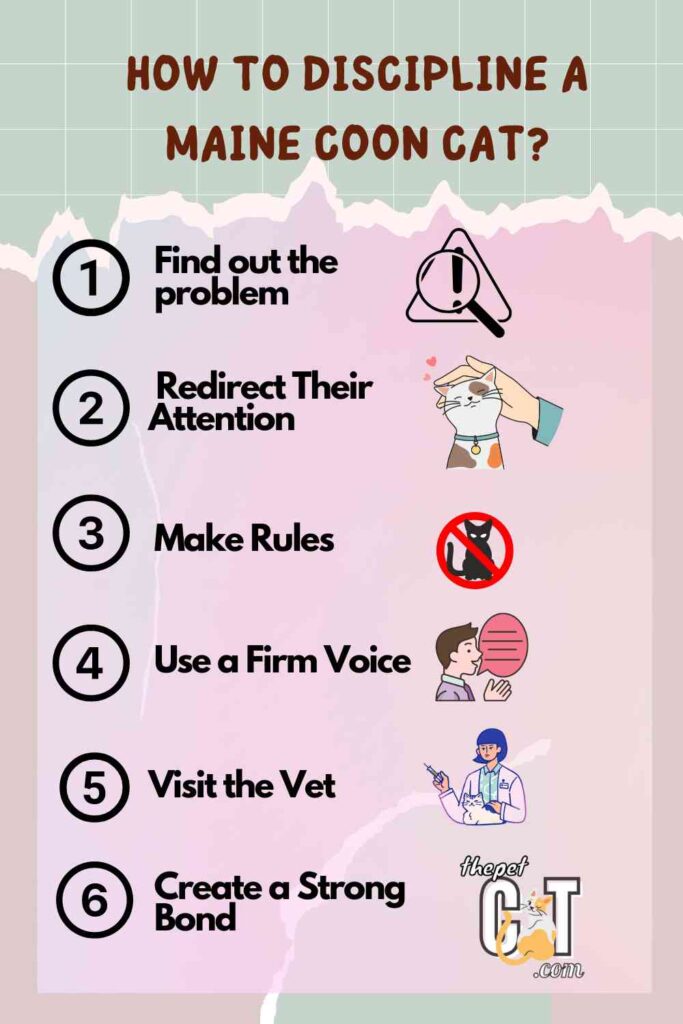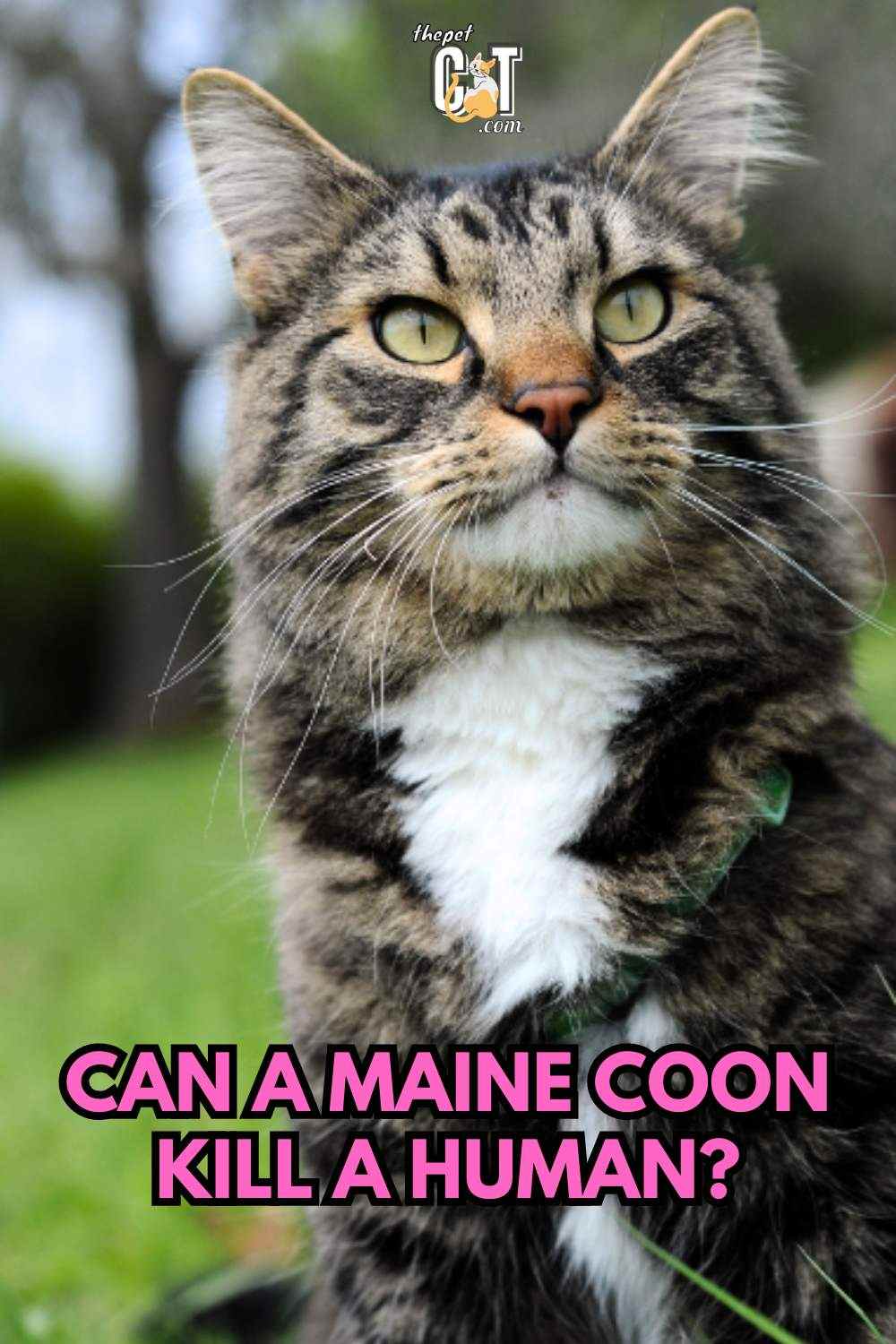No, it is extremely unlikely that a Maine Coon or any domestic cat would be able to kill a human. While they are one of the largest domestic cat breeds, they are not aggressive toward humans. They are widely believed to be the most amiable and mild-mannered feline species.
Maine Coon cats have a reputation for their untamed and enigmatic ancestry, but they have only been fully integrated into domestic life in the past few decades. Given their size, many people wonder Can a Maine coon kill a human? The following article provides a clear explanation of the response. Read On.
Can a Maine Coon Kill a Human?

Maine Coons are consistently ranked as one of the most popular breeds of household cats. Males can weigh up to twenty pounds or more and have an intimidating look due to their muscular bulk. It’s vital to remember, though, that Maine Coons are not naturally hostile or dangerous towards people, just like any other domesticated cat.
It is well known that these gentle giants are friendly and pleasant. Generally speaking, they are amiable, loving, and socially inclined. They have a reputation for being friendly toward children and other animals, and they frequently get along well with both types of animals. Many Maine Coon owners even describe them as dog-like in their behavior, displaying loyalty and a desire to interact with their human companions.
Despite their frightening size, Maine coons do not usually attack or hurt people. They are safe to keep as pets because, like all domestic cats, they have been bred to coexist peacefully with people for millennia. They will often curl up on your lap and cuddle with you rather than endanger your life.
Having said that, it is of the utmost importance to keep in mind that any animal and under specific conditions might become aggressive. Maine Coons, like other cats, can display defensive behavior when they feel threatened or perceive danger. To avoid problems, treating all animals with dignity, knowing their limits, and reading their body language is essential.
Always consult a veterinarian or animal behaviorist if you have worries about your pet’s behavior, whether it’s a Maine Coon or another type of animal. Their guidance can help you raise a contented, well-behaved, and socialized pet.
12 Maine Coon Cat Behavior Problems with Solution

Here are a few common Maine coon problems, along with practical solutions.
1. Territorial and Aggressive
Not respecting their boundaries or cramming them into an overly small living area without any privacy can make Maine Coons angry or possessive.
No matter how gentle they are, cats will always be possessive of their place. But Maine Coons are known to be fiercely possessive of their territory. These cats are prone to destructive behavior without appropriate playthings and physical activity, such as a cat tree or scratching post.
Also, this issue often arises when you live with multiple cats or animals. You should take preventative measures before your cat develops a habit out of it.
Solution: It is best to deal with this issue when the kittens are young to find an effective solution. First, provide them with a proper space to live. Also, socialize your feline friend with other cats. The more socialized a Maine Coon gets, the less territorial it will get.
2. Anxiety
Some kittens may develop separation anxiety as they grow up, and you might not even notice it. One sign of separation anxiety in cats is an intolerance to being apart from their owners for extended periods.
Solution: While you're out of the house, you might want to get your cat some toys to keep it occupied. If this fails, you may consider confining your feline friend to a certain area until your return.
3. Loud
The Maine Coon is a large cat that, when enraged, can make a lot of noise. Having to deal with their incredibly disruptive behavior is not something you’re looking forward to.
Solution: Patience is the virtue that will lead you to a solution to this situation. When your cat starts making noises and weeping loudly, you should investigate the situation to determine if it is serious. Rewarding disruptive behavior is not appropriate when your cat is trying to get your attention; instead, make it plain that it is. In any other case, it will figure out that making a lot of noise is the surest way to catch your attention.
4. Excessive Scratching
Scratching too much is a typical behavioral issue in Maine Coon cats. This kind of conduct may cause damage to household furnishings and flooring.
Solution: If your cat has a problem with destructive scratching, you can help by giving them plenty of alternatives. Another way to make them safer is to trim their nails on a regular basis.
5. Excessive Meowing
Maine Coon cats also tend to meow excessively. This behavior may indicate a desire for companionship, boredom, or attention.
Solution: The best way to deal with this behavior is to give your cat plenty of things to do and play with. Make sure your cat gets the attention and company it needs by spending quality time with it daily.
6. Not Using the Litter Box
Maine Coons usually use their litter box without incident as long as it is kept clean. Make an appointment with your vet immediately if you see your cat isn’t using the litter box, as this could be a sign of disease or other problems.
Solution: Before you treat your Maine Coon cat for behavioral problems like marking or litter box avoidance, make sure there are no medical causes. After your cat's health problems have been investigated, you should take steps to alleviate any anxiety or stress it may be feeling. To ensure that your cat uses the litter box correctly, place one in various house rooms and clean it often.
7. Clingy
No matter how much time we spend with our feline friends, it may not always be desirable. You risk your young kittens becoming if you don’t teach them to be independent. Clinginess can make some kitties act out.
Solution: It's smart to occasionally confine your kitten to a different room while you're out of the house; gradually, your kitten will learn to adapt to your absence.
8. Hyper Active at Night
Nighttime isn’t when cats are most active. Their crepuscular nature means that you can catch them at their busiest around dawn and dusk. Your cat probably didn’t receive enough exercise throughout the day if it’s hyperactive at night. When your Maine Coon doesn’t get up and move about much, it will eventually get bored, much like us humans.
Solution: Ignoring it will send the message that you need to get some sleep at night so it will stop trying to entertain you. Alternatively, you may play with it before night to wear it out. Your cat probably didn't receive enough exercise throughout the day if it's hyperactive at night. When your Maine Coon doesn't get up and move about much, it will eventually get bored, much like us humans.
9. Inappropriate Climbing
Because of their innate climbing abilities, Maine Coons can be a nuisance around the house if they start stepping on things like tables and countertops.
This may happen if you don’t penalize your Maine Coon sufficiently or if there aren’t enough cat trees or shelves for it to climb.
Solution: Teaching your cat basic home rules at an early age is crucial. For instance, if your cat gets up on a table or counter, you should put it back on the floor immediately.
10. Aggression Between Cats
The best course of action when your cat becomes violent against another cat is to assume control of the situation, just like when a Maine Coon exhibits territorial behavior. If your cat isn’t comfortable with other cats, you should try to train it to behave around them.
Solution: You can lessen the likelihood of dealing with this behavior problem in your young Maine Coon by increasing its exposure to other cats.
11. Destructive
When a Maine Coon is bored and needs mental stimulation, it may act out in ways that are obvious attempts to grab your attention, such as destroying your furniture.
Solution: If you want to wear out your cat, offering it lots of attention and stimulus is best. Allow your feline friend to accompany you wherever you go around the house.
12. Spraying
Spraying is among the most undesirable behaviors that can develop in Maine Coons. This unwanted Maine Coon behavior is practically inevitable in cats that have not been neutered. This is significant because it gets considerably more challenging to stop a cat from spraying once it starts. Anxieties, territorial feelings, or a lack of personal space can all trigger spraying in cats.
Solution: In order to alleviate the cat's worry, you must first determine what has changed in its environment and then fix it. Give your cat a place to relax that is both safe and cozy. The first thing you should do if your cat acts strangely is figure out what's wrong
How To Discipline A Maine Coon Cat?

Below are some effective ways How To Discipline A Maine Coon Cat:
Find out the problem
When determining the cause of their out-of-character behavior, it is crucial to consider changes to their surroundings, household members, diet, and other factors.
Instead of using punishment, it would be wise to consider what is causing the problem and work to resolve it. Maybe they aren’t happy because something has changed at home. Because cats dislike changes in routine, you may notice that your cat is acting out after you relocate, redecorate, or bring a new family member into the house.
Redirect Their Attention
A cat could get into trouble sometimes just because it saw something interesting. Their actions will be halted and replaced with something else if you point out their mistakes. This is the perfect opportunity to provide a positive reinforcement item, such as a toy or scratching post, that they will enjoy playing with.
Make Rules
Without knowing the rules, cats will not be able to obey them. It’s crucial to establish and communicate clear guidelines for all household cats. This will ensure everyone follows the rules and no cat is left out. Your feline buddy should not be allowed to play on the countertops of the kitchen or bathroom.
Before introducing a new cat into the house, consult the family to establish ground rules. Certain behaviors may be completely acceptable to one family member but unacceptable to another. Including the cat in the rule-making process can make everyone’s lives simpler. To ensure that everyone in the house is on the same page regarding the cat’s rules, it may be helpful to write them down and display them somewhere conspicuous.
Put Them in Time Out
Angry and defiant behavior is common in cats. Their behavior is always going to be unpredictable and demanding. They may become hostile and respond verbally.
They may feel better when you provide them with a peaceful area free from noise, stress, and anger. A laundry room, a spacious wardrobe, or just five minutes in their favorite bedroom might help them relax.
Remember that the goal here is not punishment via imprisonment but rather a change of environment to help them focus and calm down if they’ve gotten too worked up. In times of emotional distress, this tactic may prove useful.
Be Consistent
Setting clear guidelines is crucial, but being consistent is much more so. Be consistent in enforcing your rules, even if they are obvious (e.g., no touching any counter in the home, no matter what room it is).
Use a Firm Voice
Once you’ve captured their attention with the stop phrase, symbol, or sound you established before, the next step is to inform them that they made a mistake. They probably won’t notice a difference between a quiet and a loud voice; therefore, there’s no need to shout.
Visit the Vet
Taking them to the vet should be your next move if you cannot discover an explanation for their behavior at home. As an example of a shift in behavior brought on by a medical issue, consider pain-induced hostility.
Cats might get aggressive when they perceive that you are trying to touch or move them in a way that would cause discomfort. If you take your cat to the vet, they can rule out any health issues and confirm that it is fit to be reprimanded for misbehavior.
Create a Strong Bond
As a cat owner, you must do this. When a Maine Coon is bonded to its owner, the likelihood of behavioral problems decreases. Your undivided attention and playful antics might diminish a cat’s misbehavior.
Do not resort to punishment when your Maine Coon misbehaves; instead, ignore the behavior. Direct your attention towards rewarding actions that you hope will be repeated. Keeping a positive relationship with your cat is the greatest approach to ensure a lasting behavioral change. Your cat’s propensity to act out of boredom or tension decreases as their enjoyment and confidence in you increases.
Read More:
FAQs
At What Age Do Maine Coon Cats Calm Down?
Within 6 Months. Even the most tolerant cat owners may find that their Maine Coon kittens’ hyperactivity gets to be a bit much. After around six months, most Maine Coon kittens will settle down, but make sure they don’t get hurt while they’re still young.
Can Maine Coons Attack?
Any cat breed is susceptible to having aggressive tendencies. You must ascertain the nature of the situation. Bring the feline friend to the vet first. They can determine whether the root is mental or physical.
Is It Safe to Have a Maine Coon?
The Maine Coon is a pet with a lively and flexible personality. Their outgoing personality becomes apparent as they warm up to others, which takes some time. As a breed, the Maine Coon is known for being dependable and making wonderful pets for families.
Are Maine Coons Friendly?
Maine Coon cats are amiable despite their massive size. Although they are friendly cats, they won’t always need your undivided attention. Most Maine Coon cats would rather be near their owners than curled up on a lap.
What is the Downside of the Maine Coon Cat?
In comparison to other types of cats, Maine Coons tend to be healthy and rarely have common health problems. Hip dysplasia is one of the health problems that can affect these animals.
Final Verdict
So, can a Maine coon kill a human? I hope you’re more at ease with having a pet like a Maine coon now that you have the answer.
It’s important to note that any cat, regardless of breed, can display aggressive behavior in certain circumstances. Still, such instances are typically defensive and not with the intent to cause severe harm. Proper socialization, training, and a loving environment contribute to a cat’s positive behavior.
You May Also Like to Read:

